Blue (front), Linda Brox’s three-year-old Flat-Coated Retriever has been giving to OVC’s Blood Donor Program for the past two years and has donated blood six times. Tide (right), age 7, and Flint (left), age 11, are both retired blood donor dogs. Tide donated blood 13 times over a three-year period and Flint donated 24 times during his four-and-a-half-year donor career.
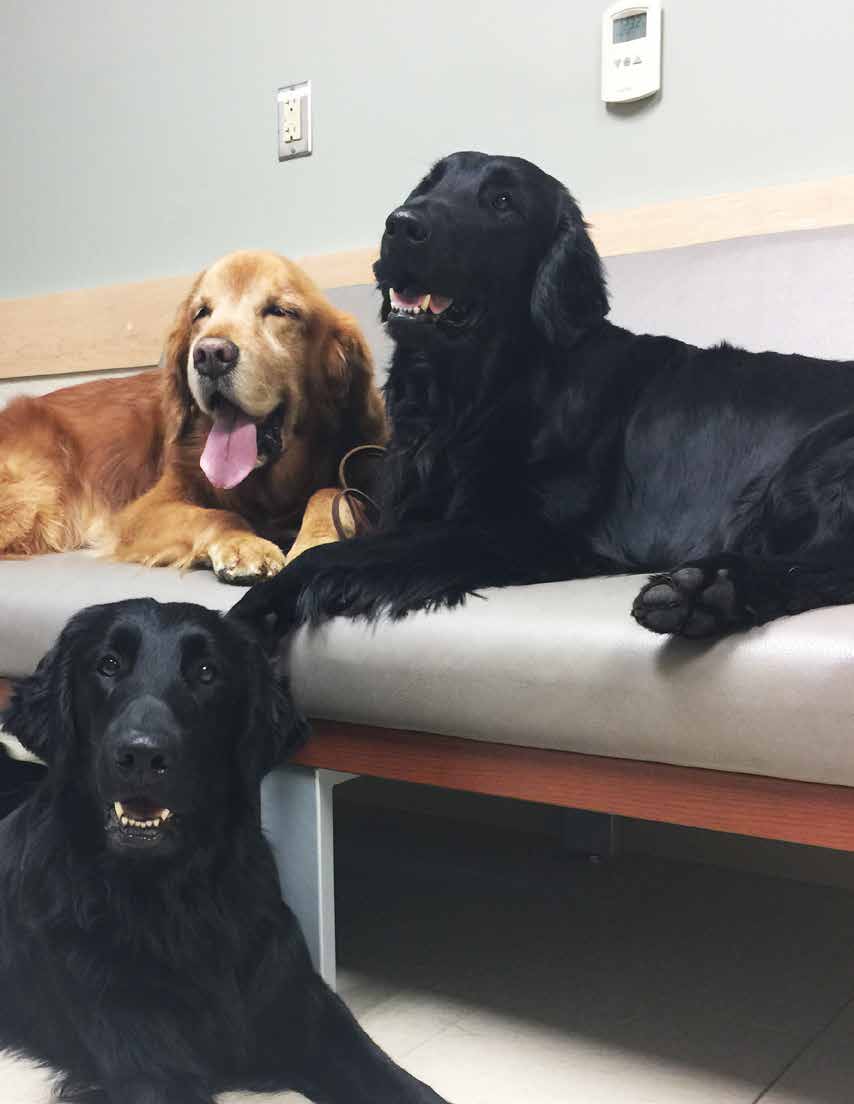
Pets come to the Ontario Veterinary College (OVC) every day in critical condition or in need or life-saving procedures. Some, such as those that require emergency surgery, need a specific cancer treatment or suffer from a chronic illness, may require a blood transfusion.
That’s exactly why OVC’s Blood Donor Program was created in the early 1980s. To take part, owners can enroll their dogs on a volunteer basis. After applying to be a blood donor, dogs receive a complete physical exam before they join the program. Once accepted, each donor dog is able to give blood once every three months and donate approximately 450 grams of blood at each visit – about the same amount donated in human blood donor programs.
Linda Brox and her dogs have been giving back to companion animal health through the blood donor program for more than 25 years. “My dogs and I take part because I want to help people that are stuck in a difficult, scary position where their dog may need a life-saving blood transfusion,” Linda says.
On top of regular blood donation visits Linda has also brought her dogs to OVC after hours in emergency situations when a patient was in immediate need of a transfusion. “I would like to think that if the situation arose someone would do the same for my dog.”
Linda found herself in that very situation a few months ago. Her Flat-Coated Retriever Tigger developed gastric dilatation-volvulus, a rapidly progressive life-threatening condition where the stomach dilates and twists around itself, requiring urgent surgery. Tigger ended up benefiting from another donor dog’s blood. He received a transfusion during his surgery and fortunately ended up recovering nicely.
While other veterinary blood banks exist in Canada, Linda says that added benefit of donation to OVC is the contribution it makes to help advance future pet health, such as Dr. Shauna Blois’ OVC Pet Trust-funded studies that examine methods to increase knowledge and improve best practices used in a variety of veterinary health care settings – ultimately helping to save more pets’ lives.
Linda is proud her dogs have been able to help so many others that require critical care or suffer from severe illness.
“OVC takes great care of its patients. I’m honoured my dogs and I can do a small part in helping them ease pain and potentially save another dog’s life.”
Blood Donor Dogs
Over a 12-month period approximately 240 units of blood are donated by dogs that are part of the Ontario Veterinary College’s Blood Donor Program.
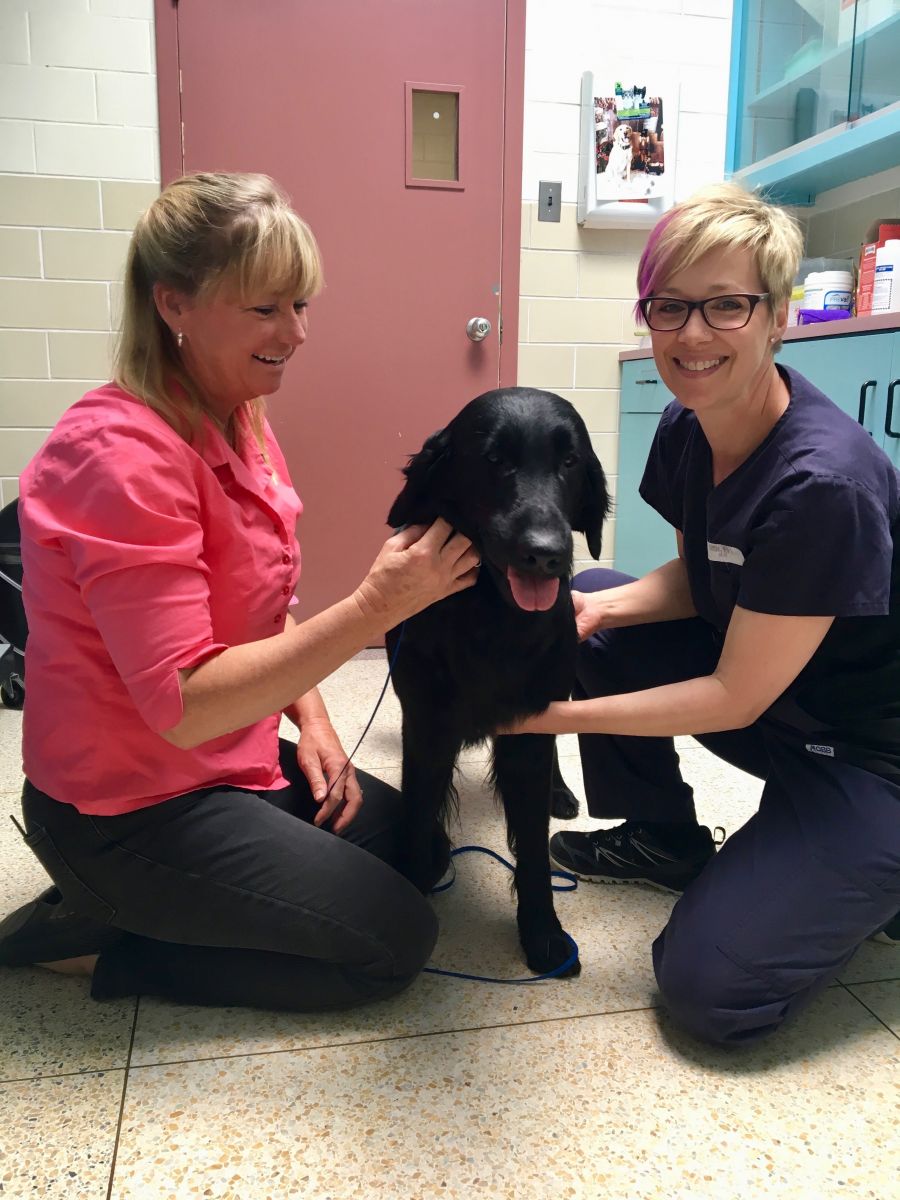
“Each unit can be made into four blood products to help up to four different dog patients that are in critical need of care,” says Ramona Fowler, a registered veterinary technician (RVT) who has worked with the program for the past 20-plus years.
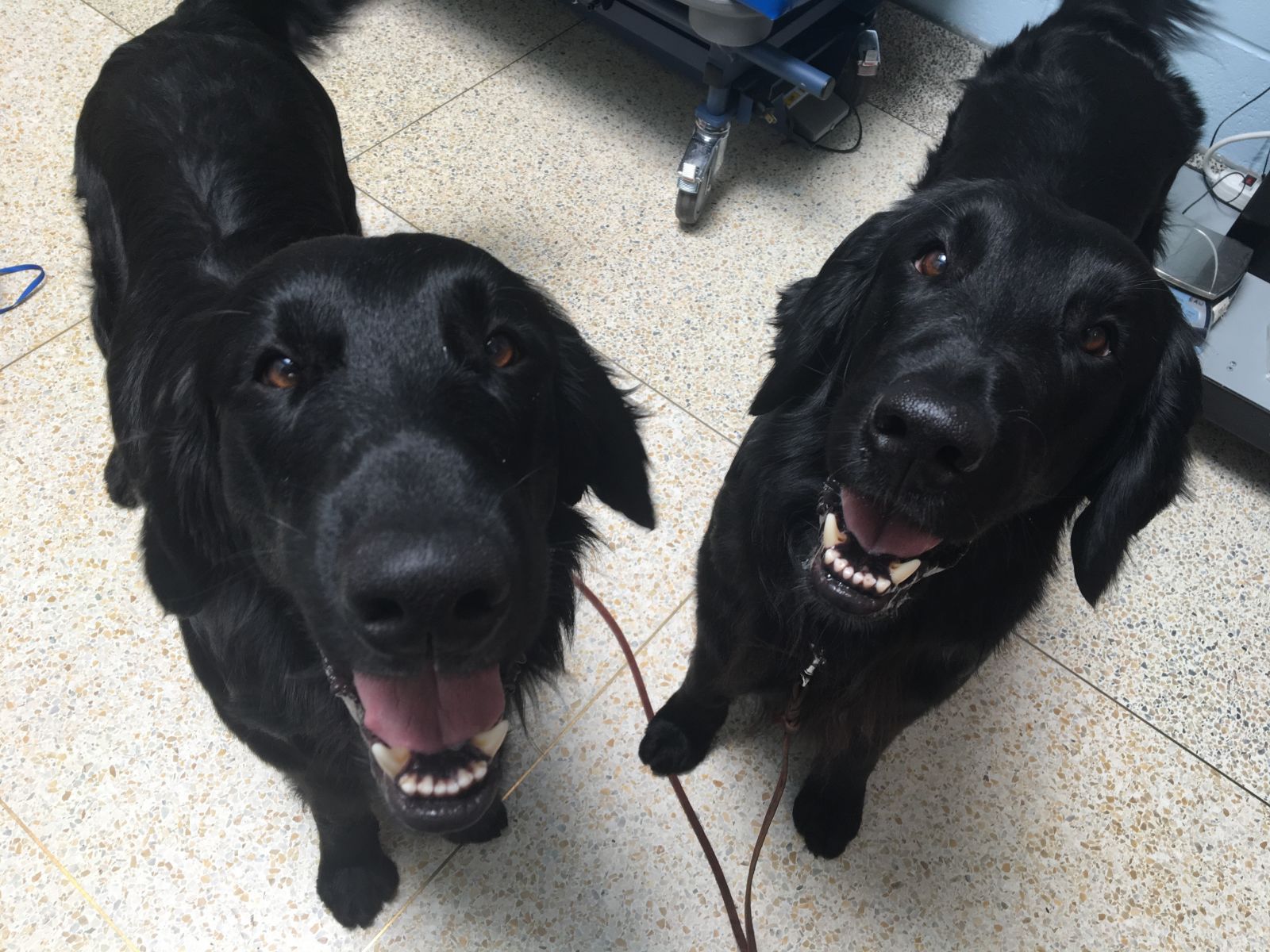 Once donated by one of the 70 dogs currently enrolled in the program, blood lasts for up to 35 days. Like humans, dogs and cats have blood types. Blood type in pets is quite different to those in people. For dogs, there are more than a dozen different blood types, while cats have only two major blood types. Just as in human health, when an animal is in need of transfusion, proper selection of blood type is critical for patient recovery.
Once donated by one of the 70 dogs currently enrolled in the program, blood lasts for up to 35 days. Like humans, dogs and cats have blood types. Blood type in pets is quite different to those in people. For dogs, there are more than a dozen different blood types, while cats have only two major blood types. Just as in human health, when an animal is in need of transfusion, proper selection of blood type is critical for patient recovery.
OVC Small Animal Internal Medicine Specialist Dr. Shauna Blois is leading a new study, funded by OVC Pet Trust, which examines cross-matching, a method used to text blood compatibility between the donor and the patient prior to blood transfusion. Although life-saving for many, blood transfusions are not without risk. By ensuring blood type compatibility, the risk of transfusion reactions, such as shock and even potentially death, are greatly reduced. Blois’ research hopes to determine if new veterinary point-of-care cross-matching kits, used to blood type pets on-site and within a 10-to-15-minute timeframe, are accurate when compared to laboratory methods which look at blood under a microscope. If successful, research results will offer insight into best practices when it comes to critical cases that require blood transfusions. This may greatly benefit pets who have suffered major blood loss due to injury, such as dogs hit by a car or those that experience massive blood loss in surgery.
How OVC Blood Donor Heroes Help Other Pets
Last year there were 332 canine blood transfusions at OVC for patients in need of life-saving care.
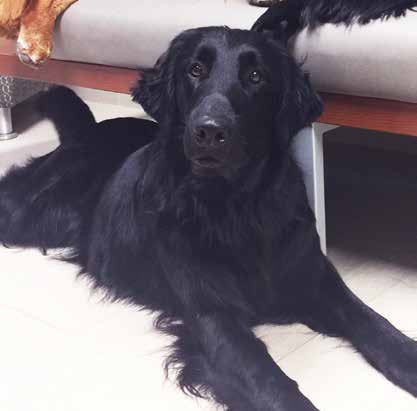
Chronic Illness
Certain conditions such as kidney disease may lead to blood loss or lack of red blood cell production. When a pet develops chronic kidney disease, their kidneys are unable to properly produce a hormone called erythropoietin, which helps control the production of red blood cells in the body. This condition is common in middle-aged and senior dogs.
Emergency & Critical Care
Emergency situations such as a dog being hit by a car or massive blood loss in surgery may require a blood transfusion. In order to be able to perform life-saving, specialized procedures, blood is readily available in the OVC Companion Animal Hospital to replenish the blood loss in the pet’s body. Ingestion of rat poison by a dog, which decreases the body’s clotting ability, would require a plasma transfusion to temporarily provide clotting proteins before the body can be cleared of toxicity and start making them on their own again.
Anemia
Anemia is a condition that arises when the number of red blood cells falls below normal values. Patients with an autoimmune disease such as immune-mediated hemolytic anemia (IMHA), a condition where the patient’s immune system destroys its own red blood cells, may require blood transfusions. All breeds of dogs and cats can develop anemia, but certain breeds may be predisposed to specific genetic conditions that may cause anemia.
Clinical Research
New point-of-care cross-matching kits to determine transfusion compatibility are being studied at OVC and may help to rapidly provide results in a clinic setting. A previous study funded by OVC Pet Trust found point-of-care blood typing kits were accurate for use in veterinary practice, allowing hospitals to perform a blood type test in just a few minutes with a few drops of blood.
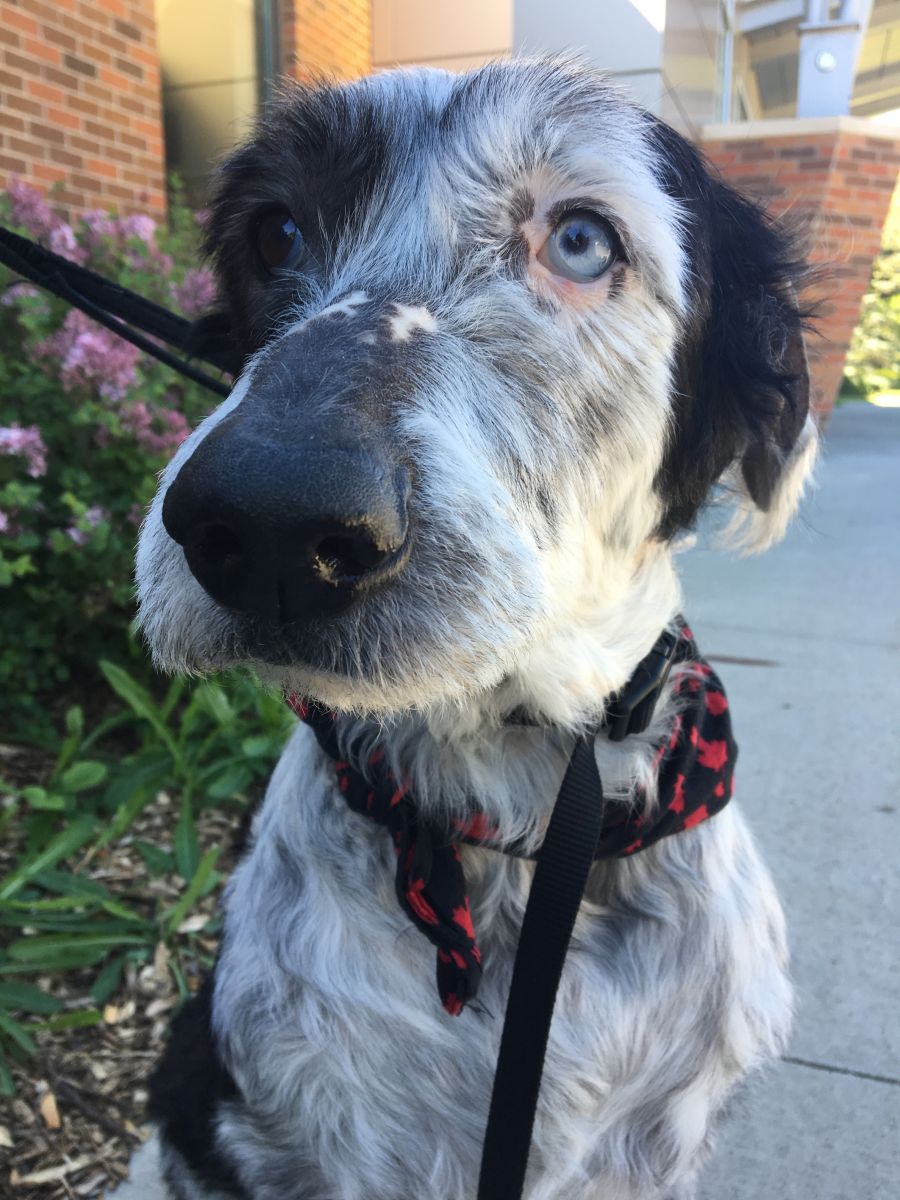
Cancer
One in four dogs and one in five cats will get cancer in their lifetime. Cancer patients may require a blood transfusion in surgery for a tumour removal, anemia from leukemia or while undergoing chemotherapy. Chemotherapy drugs specifically affect cells in the bone marrow, which can put a pet at-risk for anemia or life-threatening infections.
Ten-year-old Fluka (right) was diagnosed with leukemia in October 2016. While she was undergoing chemotherapy, she received a blood transfusion from Blue (above).
To learn more about the OVC Blood Donor Program or to apply for your dog to donate blood, please visit the OVC Health Sciences Centre website.
Originally published in the Fall 2017 issue of Best Friends Magazine.

